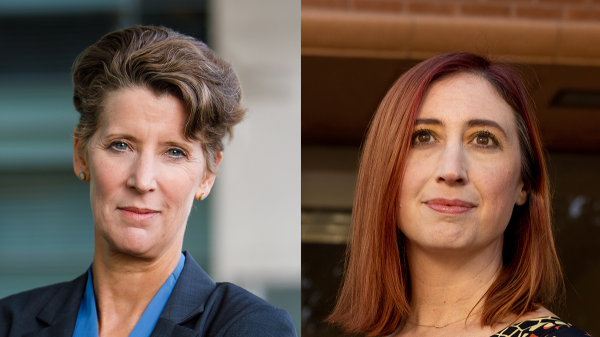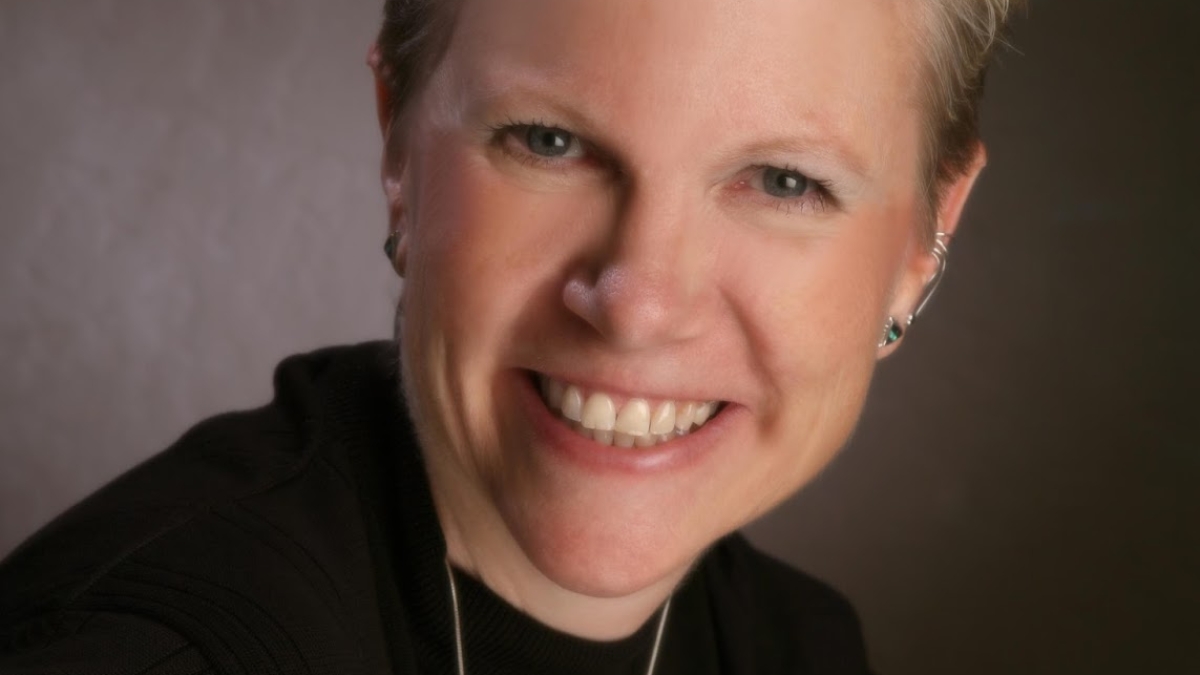Brave, outspoken women throughout history have advocated for women's rights and equality. There are women in history with recognizable names, but what about the other women? The first woman doctor, birth control advocate, and those who fought for women's voting rights. These women blazed a trail where one did not exist and because of this, women hold many rights they were once denied.
Dr. Pamela Stewart, a historian and senior lecturer in the College of Letters and Sciences at ASU's Downtown Phoenix campus, received a doctorate in Modern European and Comparative Women’s History. She is a recipient of research, teaching and service awards, including ASU's Centennial Professorship.
Women's history? Oh, yes. Stewart is passionate about that. Her earlier research focused on women in war and revolution in 1870-71 Paris, while her current work focuses on female athletes in U.S. history, such as Ina E. Gittings, a multifaceted pioneer and the first university director of Women's Physical Education and Athletics in Arizona (1920-1952).
As Women's History Month comes to a close, Stewart explains why we should all still care about women's history and women's rights. Find out why everyone should dare to be "radical."
Question: What was it like for women during Colonial times?
Answer: This era exposes the wide-ranging possibilities for better understanding History — capital-H, as I term it — once women become visible in this centuries-long era: Was she enslaved? Indentured servant? Native American? Of European descent whose father/husband/brother had some wealth or land? A free Afro-Mexican now among Californios?
Our collective imagination tends to conjure up Colonial women as (white) women with many petticoats embroidering as their founding-father husbands labored over independence documents. While a few fit that description, the fuller story requires more imagination.
For example, slavery increased dramatically over these centuries, and women’s bodies existed at the center of that reality. Anglo tradition required feme coverture, meaning that at marriage, a husband’s legal standing subsumed the wife’s legal standing, offering no individual rights. The constitution removed neither slavery nor coverture from law.
In Spanish colonies, women’s status offered more options to those in what are today Florida, New Mexico, Arizona and California.
Native American women were a diverse group with hundreds of languages and cultures, most of which understood the sexes as needing balance between them, rather than the hierarchical approach enforced by Europeans.
I highly recommend Laurel Thatcher Ulrich’s "Good Wives" for Colonial New England, Theda Perdue’s "Cherokee Women," and "The History of Mary Prince, a Slave" as excellent introductions to aspects of the contact and conflict suggested by this overview.
Q: Who are the women in history who were instrumental in changing how women are perceived and ensuring the many rights women hold today?
A: Accessing rights is always a collective effort even as some certainly stand out, and the diversity within all movements for change is often a fundamentally important consideration.
Focusing on U.S. from the 19th century onward: Elizabeth Cady Stanton and Susan B. Anthony, Elizabeth Blackwell (first woman doctor in the US), Ida B. Wells (anti-lynching crusader), Margaret Sanger (birth-control advocate), Eleanor Roosevelt (first lady and justice advocate), Dolores Huerta (co-founder, United Farm Workers; civil-rights activist), Wilma Mankiller (first woman chief, Cherokee Nation; indigenous-rights advocate), and Shirley Chisholm (first African-American woman in Congress and first woman to make a serious run for the presidency).
I could easily add others including Angela Davis (still going strong) and Patsy Mink (first woman of color elected to Congress, Title IX advocate). All adamantly campaigned for women, as women, to be understood as central, not tangential, in the United States of America and beyond. All developed their advocacy over time and through diverse experience, all actively worked to ensure rights that women hold today — and all took unimaginable flak for doing so.
Q: Women of color went through their own struggle in obtaining equal rights. Can you share some background on this topic?
A: Not all tread the same path towards equality. Women’s-rights advocacy includes a history of arguing for white — often middle-class — women’s rights.
In the wake of Supreme Court rulings in the 19th century determining that the 14th amendment did not understand women as “persons” under the law when it came to voting or much else, Susan B. Anthony (and others) decided that the suffrage movement would prioritize white women, therefore potentially getting Southern white women on board in a Jim Crow world.
African-American women such as Ida B. Wells adamantly resisted this approach. When the 19th amendment passed, it had virtually no effect on African-American women’s right to vote in the South, just as the 15th amendment guaranteeing black men the right to vote no longer held sway there. Women such as Fannie Lou Hamer and Septima Clark occupied the core of the civil-rights movement, however, and from the 1960s onward, groups such as the Combahee River Collective, taking its name from events in the life of Harriet Tubman, asserted the need for women of color to unite and press for a correction of white feminists’ understanding of “equal rights.”
While change continues, these struggles are not over, as the women who co-founded #BlackLivesMatter can attest.
Q: What is the importance the women’s-rights movement, and why should we still care?
A: Not all women have equal rights with those who have the longest history of possessing them.
Repeatedly I hear from young women who have assumed they have equal opportunity, pay and access to all civil rights. Yet experience then exerts a blow when they discover (in a class or at work) that is not always the case. Suddenly the personal is political, as earlier feminists discovered.
The word "feminist" has been around for over 100 years, and those embracing it have always faced vitriol and demonizing, to the degree that they faced or face bodily harm, going back to women’s first attempts to gain the right to vote in an era many deem more “polite” than our own.
Arguments of 19th- and early 20th-century women still sound “radical” to some among us today, such as when they argued for “voluntary motherhood” or the right of women and men to find meaning and independence in paid work.
African-Americans, immigrants and women of all stripes often found violence was the “answer” many put forth against those who said, “I want my vote too — just like you.”
No one’s rights are ensured, something history demonstrates especially well.
Q: Why should women’s history matter to everyone?
A: A woman relevant to my research on a 19th-century Paris revolution wrote, “The history of women is the history of humanity.” Women’s lives have been inextricably integrated with men’s, yet too often we still see the category of “women” as an addendum, sidebar or adjective, rather than a global majority across most of history.
Not seeing what women have done leads us to misunderstand history as a whole, but more importantly perhaps, it leads to incorrect statements that morph into problematic policies like: Women have never been in combat before so ... Women can’t do math like men can so ... Women don’t have enough upper-body strength to ... We can be quite selective in calling on history.
In the lab, a demonstrable exception to the rule means one must adjust or throw out the “rule.” But in human society, we too often hang onto the “rule” at the expense of noticing how many exceptions have already proven it wrong. Thinking historically allows us to see how much women have already been doing and therefore, allow us to get more right, creating greater opportunity and innovations across the board.
Q: What are the top five books all women should read?
A: There are just so many good, important books. I decided to focus on four first-person narratives and one novel that do an important job bringing us into their (very different, very real) worlds, allowing us to see that being female can matter a great deal. Yet all of them also expose that point within a much larger context. That is, see what women themselves did, rather than reading what someone says they did.
- Harriet Jacobs, "Incidents in the Life of a Slave Girl"
- Rachel Calof, "Rachel Calof’s Story: Jewish Homesteader of the Northern Plains"
- Dorothy Canfield Fisher, "The Home-Maker" (novel from the '20s)
- Olga Lengyel, "Five Chimneys: A Woman Survivor’s True Story of Auschwitz"
- Shirley Chisholm, "Unbought and Unbossed"
If I could sneak in one more that defies my description above, I’d suggest Rebecca Skloot’s "The Immortal Life of Henrietta Lacks." A fundamentally important read for anyone.
Q: If you could eat dinner with any influential woman in history, who would that be and why?
A: So many! But I’ll first narrow it down to two: Ida B. Wells Barnett and Eleanor Roosevelt. Again and again in my teaching, research, and as I engage with current events, their names remain fundamentally at a nexus of significance that has yet to be fully acknowledged and analyzed. But I’ll choose Wells as my dinner companion.
She was what Martin Luther King termed a “creative extremist.” Her autobiography, "Crusade for Justice," wasn’t published till 40 years after her death in 1931 but is an important read. Her writings and speeches associated with her crusade against lynching not only stand up to scrutiny today, but form the basis of investigative journalism. Her analysis remains relevant as we continue to discuss race in this country and beyond. She refused to give up her seat on a train, suing a railroad company for discrimination before Plessy v. Ferguson or Rosa Parks refused to give up her seat — and initially, she won. She married and had four children (to Susan B. Anthony’s dismay, who thought it would limit her work), but always went where called, where needed, something that remains a tension for many women. Oh to talk with her …
More University news

2 ASU faculty members elected to prestigious National Academy of Medicine
Two distinguished Arizona State University faculty members have been elected to the National Academy of Medicine.Sally C.…

ASU establishes Center for Free Speech, will host annual free speech forum
Arizona State University is establishing a new Center for Free Speech to encourage the uninhibited exchange of ideas, and the…

Public affairs professor, back at ASU after 3 years with NSF, is named Sackton Chair
After three years at the National Science Foundation, Professor Mary Feeney has returned to Arizona State University, where she…
